-
 Bitcoin
Bitcoin $84,800.7048
2.32% -
 Ethereum
Ethereum $1,882.5584
2.87% -
 Tether USDt
Tether USDt $1.0000
0.01% -
 XRP
XRP $2.0968
-0.03% -
 BNB
BNB $603.2602
-0.62% -
 Solana
Solana $124.5532
-0.44% -
 USDC
USDC $0.9999
-0.02% -
 Dogecoin
Dogecoin $0.1707
1.90% -
 Cardano
Cardano $0.6689
0.47% -
 TRON
TRON $0.2384
0.86% -
 Toncoin
Toncoin $4.0121
-3.28% -
 Chainlink
Chainlink $13.7734
0.97% -
 UNUS SED LEO
UNUS SED LEO $9.4100
2.89% -
 Stellar
Stellar $0.2672
0.86% -
 Avalanche
Avalanche $19.2693
1.92% -
 Sui
Sui $2.3662
2.82% -
 Shiba Inu
Shiba Inu $0.0...01237
-2.05% -
 Hedera
Hedera $0.1657
1.14% -
 Polkadot
Polkadot $4.0848
0.85% -
 Litecoin
Litecoin $82.9308
-0.63% -
 MANTRA
MANTRA $6.2006
-1.38% -
 Bitcoin Cash
Bitcoin Cash $304.9806
0.27% -
 Bitget Token
Bitget Token $4.5883
-0.15% -
 Dai
Dai $1.0001
0.02% -
 Ethena USDe
Ethena USDe $0.9998
-0.01% -
 Pi
Pi $0.6918
-2.64% -
 Hyperliquid
Hyperliquid $13.0896
-1.19% -
 Monero
Monero $218.5433
0.66% -
 Uniswap
Uniswap $6.1491
2.50% -
 Aptos
Aptos $5.2452
-0.95%
What is the rebalancing interval for Bitcoin ETFs?
Bitcoin ETF rebalancing intervals vary from daily to quarterly, impacting tracking error and costs; investors should review the prospectus for specific fund strategies.
Mar 27, 2025 at 08:21 am
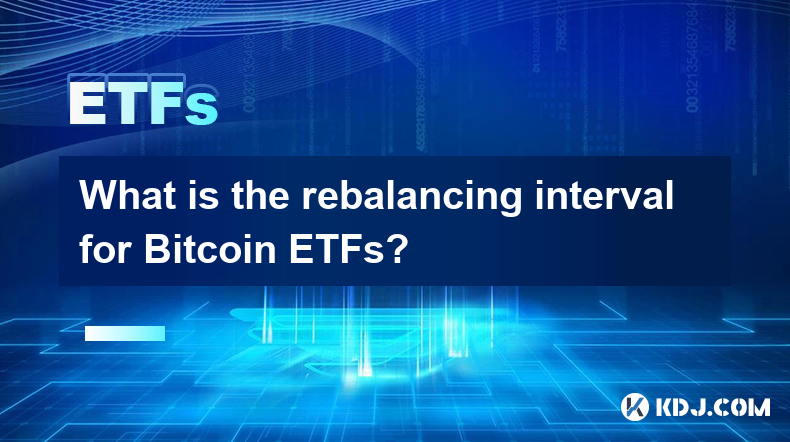
Understanding Bitcoin ETF Rebalancing
Bitcoin Exchange-Traded Funds (ETFs) aim to track the price of Bitcoin, offering investors exposure to the cryptocurrency without directly holding it. A crucial aspect of any ETF is its rebalancing strategy, which dictates how frequently the fund's holdings are adjusted to maintain its target allocation. The rebalancing interval for Bitcoin ETFs is not standardized and varies depending on the specific fund's investment strategy and objectives. Some may rebalance daily, others weekly, monthly, or even quarterly. This choice impacts the fund's tracking error (the difference between the ETF's price and the underlying Bitcoin price) and its trading costs.
Factors Influencing Rebalancing Frequency
Several factors influence a Bitcoin ETF's rebalancing interval. The fund manager's investment philosophy plays a significant role. A more actively managed ETF might opt for frequent rebalancing to minimize tracking error, while a passively managed ETF might choose less frequent adjustments to reduce trading costs. Market volatility also plays a part; higher volatility might necessitate more frequent rebalancing to maintain the desired exposure to Bitcoin. Finally, the ETF's prospectus, a legally required document, clearly outlines its rebalancing policy. It's vital for investors to review this document to understand the specific frequency for their chosen fund.
The Impact of Rebalancing Frequency on Investors
The rebalancing interval directly impacts the ETF's performance and the investor experience. More frequent rebalancing generally leads to lower tracking error, meaning the ETF's price more closely mirrors Bitcoin's price. However, it also increases trading costs, potentially eating into returns. Less frequent rebalancing reduces trading costs but might result in a larger tracking error, especially during periods of significant price swings. Investors should consider their own risk tolerance and investment goals when evaluating the impact of different rebalancing frequencies. Understanding this aspect is crucial for making informed investment decisions.
Rebalancing Mechanics in Bitcoin ETFs
The actual rebalancing process for a Bitcoin ETF involves buying or selling Bitcoin to adjust the fund's holdings. This is typically done through the ETF's authorized participants, who are large institutional investors responsible for creating and redeeming ETF shares. The process aims to maintain the fund's target allocation to Bitcoin, which is usually specified in the fund's prospectus. The frequency of this process directly relates to the rebalancing interval. For instance, a daily rebalancing ETF would see daily adjustments, while a monthly rebalancing ETF would only adjust its holdings once a month.
Different Rebalancing Approaches
While some Bitcoin ETFs might stick to a fixed rebalancing interval, others may employ more dynamic strategies. These could involve rebalancing based on pre-defined thresholds or using algorithms that adjust the frequency based on market conditions. This added complexity aims to optimize the ETF's performance while minimizing costs. However, it also adds another layer of complexity for investors to understand. Therefore, carefully studying the fund's prospectus is crucial to grasp the nuances of its rebalancing approach.
The Role of Authorized Participants
Authorized participants (APs) play a critical role in the rebalancing process of Bitcoin ETFs. They are large institutional investors who are authorized to create and redeem ETF shares. During rebalancing, the fund manager might instruct APs to buy or sell Bitcoin to adjust the fund's holdings. This process ensures the ETF maintains its target allocation. The efficiency and cost-effectiveness of the AP network significantly influence the overall cost of rebalancing and, consequently, the ETF's expense ratio. A well-functioning AP network is crucial for a smooth rebalancing process.
The Importance of Transparency
Transparency regarding the rebalancing process is crucial for investors. The ETF's prospectus should clearly outline the rebalancing methodology, including the frequency, the triggers for rebalancing, and the process itself. Regular reporting on the fund's holdings and trading activity should also be provided. This level of transparency allows investors to assess the fund's performance and evaluate the effectiveness of its rebalancing strategy. Lack of transparency can lead to uncertainty and potentially erode investor confidence.
Potential Risks Associated with Rebalancing
While rebalancing is necessary to maintain the ETF's target allocation, it does carry some risks. Frequent rebalancing can increase transaction costs, impacting the fund's overall performance. Furthermore, rebalancing during periods of high market volatility can be challenging and potentially lead to larger tracking errors. The timing of rebalancing can also influence the fund's performance, although this is usually mitigated by well-designed strategies. Understanding these risks is crucial for informed investment decisions.
Comparing Rebalancing Intervals Across Different Bitcoin ETFs
Different Bitcoin ETFs will have different rebalancing intervals, reflecting the fund managers' investment strategies and philosophies. Some may choose daily rebalancing for tighter tracking, while others might opt for less frequent rebalancing to minimize costs. Investors should compare the rebalancing policies of different ETFs before making an investment decision. This comparison should be done in conjunction with an analysis of the fund's expense ratio, tracking error, and overall performance.
The Future of Rebalancing in Bitcoin ETFs
As the Bitcoin ETF market matures, we might see the emergence of more sophisticated rebalancing strategies. The use of artificial intelligence and machine learning could lead to more dynamic and efficient rebalancing algorithms, optimizing the trade-off between tracking error and transaction costs. Furthermore, advancements in blockchain technology might streamline the rebalancing process, making it faster and more cost-effective. The evolution of rebalancing strategies will likely be an important factor shaping the future of Bitcoin ETFs.
Frequently Asked Questions
Q: What is the typical rebalancing interval for a Bitcoin ETF?
A: There's no single "typical" interval. It varies significantly, ranging from daily to quarterly, depending on the specific ETF's investment strategy, as detailed in its prospectus. Always check the prospectus for the specific ETF you are considering.
Q: How does rebalancing affect the ETF's performance?
A: Frequent rebalancing generally leads to lower tracking error but higher transaction costs. Less frequent rebalancing reduces costs but may result in larger tracking errors, especially during volatile periods. The optimal frequency is a trade-off between these two factors.
Q: Who is responsible for rebalancing a Bitcoin ETF?
A: The ETF's fund manager is responsible for overseeing the rebalancing process. They typically work with authorized participants (APs) who execute the actual buying and selling of Bitcoin to adjust the fund's holdings. The prospectus will detail the specific roles and responsibilities.
Q: Are there any risks associated with rebalancing?
A: Yes. Frequent rebalancing can increase transaction costs, while infrequent rebalancing can lead to larger tracking errors during volatile market conditions. The timing of rebalancing can also affect performance.
Q: Where can I find information about a Bitcoin ETF's rebalancing policy?
A: The ETF's prospectus, a legally required document, will clearly outline the fund's rebalancing policy, including the frequency and methodology. It's crucial to review this document before investing.
Disclaimer:info@kdj.com
The information provided is not trading advice. kdj.com does not assume any responsibility for any investments made based on the information provided in this article. Cryptocurrencies are highly volatile and it is highly recommended that you invest with caution after thorough research!
If you believe that the content used on this website infringes your copyright, please contact us immediately (info@kdj.com) and we will delete it promptly.
- Mastercard Launches Multi-Token Network (MTN) to Connect Traditional Finance and Digital Assets
- 2025-04-02 10:35:12
- LCX is set to participate in the Paris Blockchain Week, which commences on April 8th in Paris.
- 2025-04-02 10:35:12
- FIO Protocol's head of marketing, Marie Grig, will participate in Paris Blockchain Week
- 2025-04-02 10:30:12
- DTX Exchange (DTX) Token Price Prediction: Will the DTX Presale Ever End?
- 2025-04-02 10:30:12
- Binance's Routine Contract Rule Adjustment Accidentally Exposed the Most Vulnerable Pimple in the Crypto Market
- 2025-04-02 10:25:12
- 3 To 6 Months Old Bitcoin Buyers Have Been Holding Strong Recently, Showing Conviction Not Capitulation
- 2025-04-02 10:25:12
Related knowledge
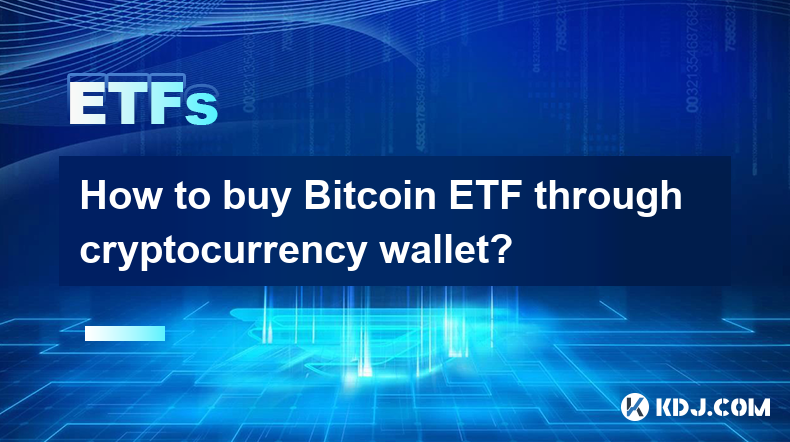
How to buy Bitcoin ETF through cryptocurrency wallet?
Mar 30,2025 at 08:22pm
It's important to understand that you cannot directly buy a Bitcoin ETF through a cryptocurrency wallet. Cryptocurrency wallets are designed to hold and manage digital assets like Bitcoin itself, not exchange-traded funds (ETFs). Bitcoin ETFs are traded on traditional stock exchanges, not decentralized cryptocurrency exchanges. Therefore, the process i...
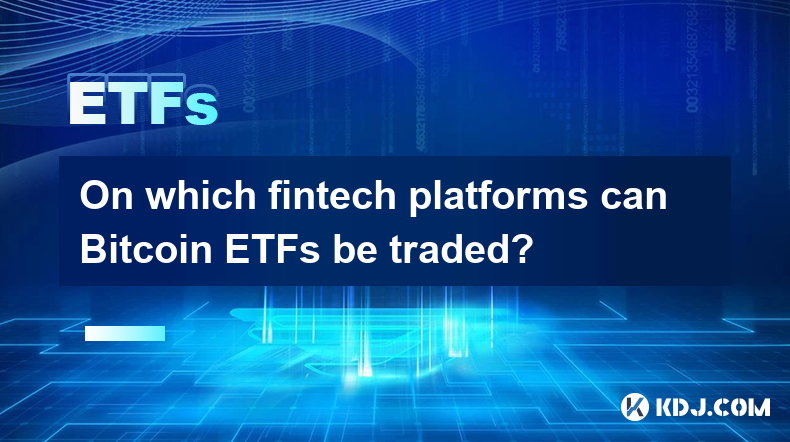
On which fintech platforms can Bitcoin ETFs be traded?
Mar 28,2025 at 09:21am
Navigating the Bitcoin ETF Landscape on Fintech PlatformsThe availability of Bitcoin ETFs on fintech platforms is a rapidly evolving landscape. Currently, the approval and subsequent listing of Bitcoin ETFs are subject to regulatory hurdles and vary significantly by jurisdiction. Therefore, the specific platforms offering Bitcoin ETF trading depend hea...
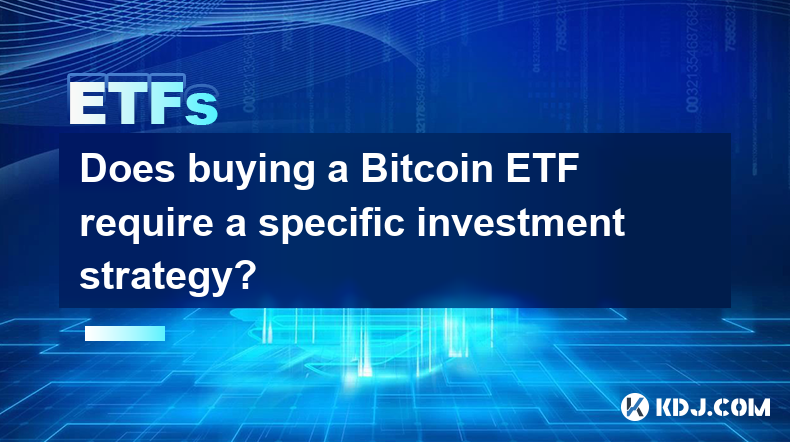
Does buying a Bitcoin ETF require a specific investment strategy?
Mar 27,2025 at 06:36pm
Understanding Bitcoin ETFs and Investment StrategiesA Bitcoin Exchange-Traded Fund (ETF) is a type of investment fund that tracks the price of Bitcoin. Investing in a Bitcoin ETF offers exposure to the cryptocurrency market without the complexities of directly owning and securing Bitcoin. However, like any investment, a successful strategy requires car...
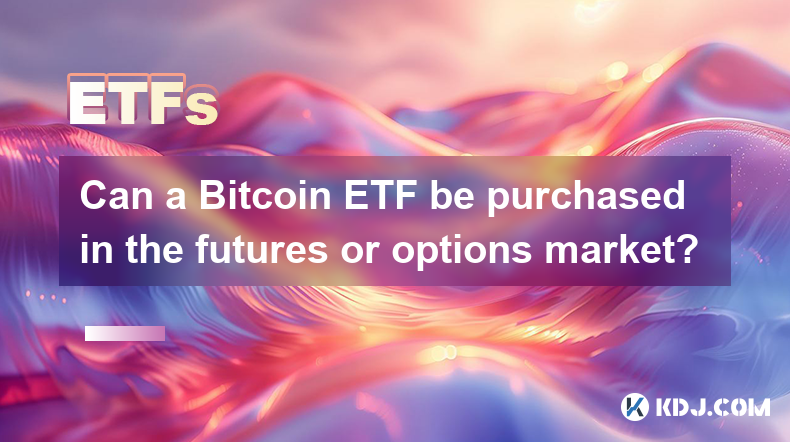
Can a Bitcoin ETF be purchased in the futures or options market?
Mar 27,2025 at 02:49am
Understanding Bitcoin ETFs and Derivative MarketsA Bitcoin ETF (Exchange-Traded Fund) is a fund that tracks the price of Bitcoin. Unlike directly buying Bitcoin, an ETF offers a more regulated and accessible way for investors to gain exposure to the cryptocurrency market through traditional brokerage accounts. However, the availability of a Bitcoin ETF...
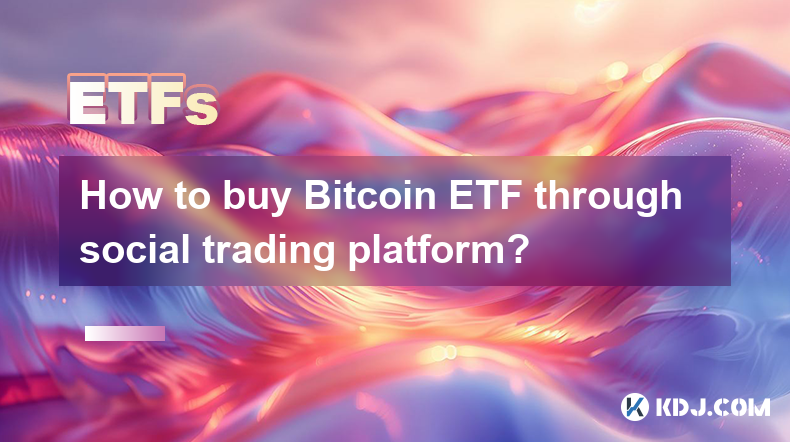
How to buy Bitcoin ETF through social trading platform?
Mar 27,2025 at 10:43am
How to Buy Bitcoin ETF Through Social Trading Platforms? Understanding Bitcoin ETFs and Social TradingA Bitcoin ETF (Exchange-Traded Fund) is a fund that tracks the price of Bitcoin. Unlike directly buying Bitcoin, an ETF offers a regulated and potentially less volatile way to gain exposure to the cryptocurrency market. This is because ETFs are traded o...
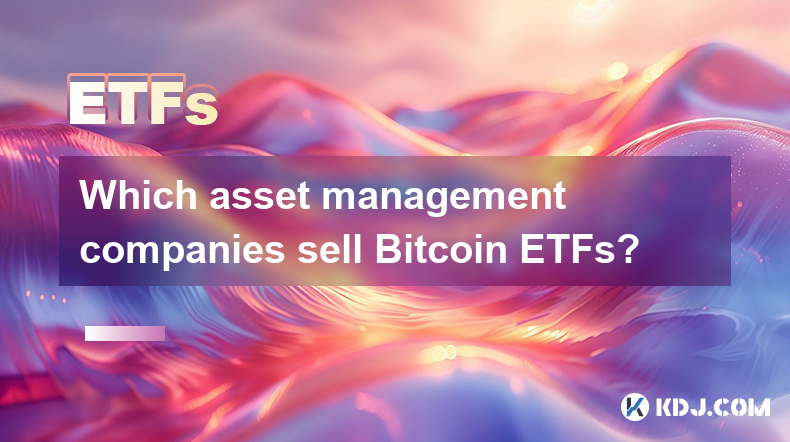
Which asset management companies sell Bitcoin ETFs?
Mar 28,2025 at 02:21am
The Current Landscape of Bitcoin ETF OfferingsCurrently, no asset management company offers a fully-fledged, SEC-approved Bitcoin ETF in the United States. While several companies have filed applications, the Securities and Exchange Commission (SEC) has yet to approve any. This is primarily due to concerns surrounding market manipulation, investor prot...

How to buy Bitcoin ETF through cryptocurrency wallet?
Mar 30,2025 at 08:22pm
It's important to understand that you cannot directly buy a Bitcoin ETF through a cryptocurrency wallet. Cryptocurrency wallets are designed to hold and manage digital assets like Bitcoin itself, not exchange-traded funds (ETFs). Bitcoin ETFs are traded on traditional stock exchanges, not decentralized cryptocurrency exchanges. Therefore, the process i...

On which fintech platforms can Bitcoin ETFs be traded?
Mar 28,2025 at 09:21am
Navigating the Bitcoin ETF Landscape on Fintech PlatformsThe availability of Bitcoin ETFs on fintech platforms is a rapidly evolving landscape. Currently, the approval and subsequent listing of Bitcoin ETFs are subject to regulatory hurdles and vary significantly by jurisdiction. Therefore, the specific platforms offering Bitcoin ETF trading depend hea...

Does buying a Bitcoin ETF require a specific investment strategy?
Mar 27,2025 at 06:36pm
Understanding Bitcoin ETFs and Investment StrategiesA Bitcoin Exchange-Traded Fund (ETF) is a type of investment fund that tracks the price of Bitcoin. Investing in a Bitcoin ETF offers exposure to the cryptocurrency market without the complexities of directly owning and securing Bitcoin. However, like any investment, a successful strategy requires car...

Can a Bitcoin ETF be purchased in the futures or options market?
Mar 27,2025 at 02:49am
Understanding Bitcoin ETFs and Derivative MarketsA Bitcoin ETF (Exchange-Traded Fund) is a fund that tracks the price of Bitcoin. Unlike directly buying Bitcoin, an ETF offers a more regulated and accessible way for investors to gain exposure to the cryptocurrency market through traditional brokerage accounts. However, the availability of a Bitcoin ETF...

How to buy Bitcoin ETF through social trading platform?
Mar 27,2025 at 10:43am
How to Buy Bitcoin ETF Through Social Trading Platforms? Understanding Bitcoin ETFs and Social TradingA Bitcoin ETF (Exchange-Traded Fund) is a fund that tracks the price of Bitcoin. Unlike directly buying Bitcoin, an ETF offers a regulated and potentially less volatile way to gain exposure to the cryptocurrency market. This is because ETFs are traded o...

Which asset management companies sell Bitcoin ETFs?
Mar 28,2025 at 02:21am
The Current Landscape of Bitcoin ETF OfferingsCurrently, no asset management company offers a fully-fledged, SEC-approved Bitcoin ETF in the United States. While several companies have filed applications, the Securities and Exchange Commission (SEC) has yet to approve any. This is primarily due to concerns surrounding market manipulation, investor prot...
See all articles























































































